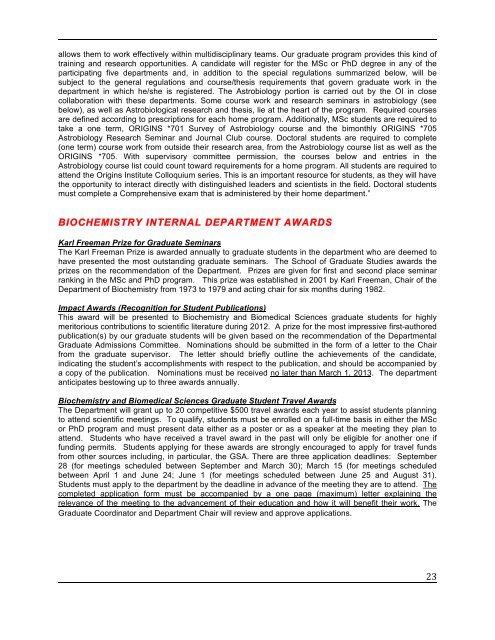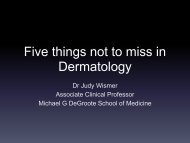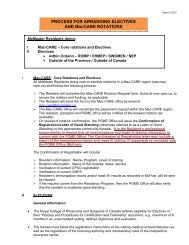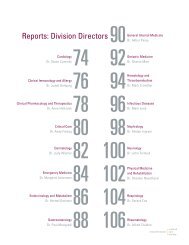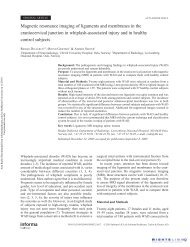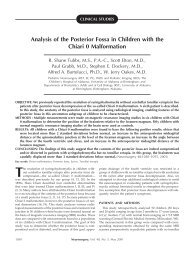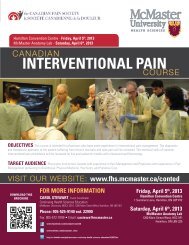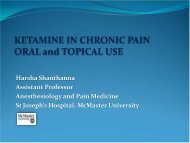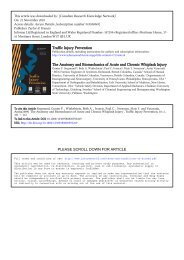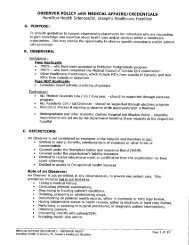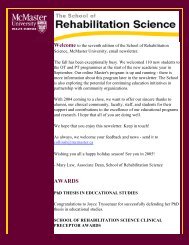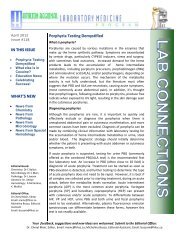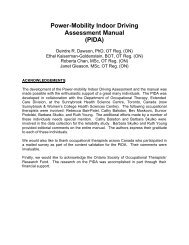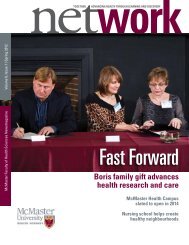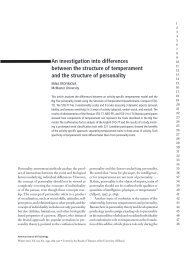Graduate Handbook - Faculty of Health Sciences - McMaster ...
Graduate Handbook - Faculty of Health Sciences - McMaster ...
Graduate Handbook - Faculty of Health Sciences - McMaster ...
Create successful ePaper yourself
Turn your PDF publications into a flip-book with our unique Google optimized e-Paper software.
allows them to work effectively within multidisciplinary teams. Our graduate program provides this kind <strong>of</strong><br />
training and research opportunities. A candidate will register for the MSc or PhD degree in any <strong>of</strong> the<br />
participating five departments and, in addition to the special regulations summarized below, will be<br />
subject to the general regulations and course/thesis requirements that govern graduate work in the<br />
department in which he/she is registered. The Astrobiology portion is carried out by the OI in close<br />
collaboration with these departments. Some course work and research seminars in astrobiology (see<br />
below), as well as Astrobiological research and thesis, lie at the heart <strong>of</strong> the program. Required courses<br />
are defined according to prescriptions for each home program. Additionally, MSc students are required to<br />
take a one term, ORIGINS *701 Survey <strong>of</strong> Astrobiology course and the bimonthly ORIGINS *705<br />
Astrobiology Research Seminar and Journal Club course. Doctoral students are required to complete<br />
(one term) course work from outside their research area, from the Astrobiology course list as well as the<br />
ORIGINS *705. With supervisory committee permission, the courses below and entries in the<br />
Astrobiology course list could count toward requirements for a home program. All students are required to<br />
attend the Origins Institute Colloquium series. This is an important resource for students, as they will have<br />
the opportunity to interact directly with distinguished leaders and scientists in the field. Doctoral students<br />
must complete a Comprehensive exam that is administered by their home department.”<br />
BIOCHEMISTRY INTERNAL DEPARTMENT AWARDS<br />
Karl Freeman Prize for <strong>Graduate</strong> Seminars<br />
The Karl Freeman Prize is awarded annually to graduate students in the department who are deemed to<br />
have presented the most outstanding graduate seminars. The School <strong>of</strong> <strong>Graduate</strong> Studies awards the<br />
prizes on the recommendation <strong>of</strong> the Department. Prizes are given for first and second place seminar<br />
ranking in the MSc and PhD program. This prize was established in 2001 by Karl Freeman, Chair <strong>of</strong> the<br />
Department <strong>of</strong> Biochemistry from 1973 to 1979 and acting chair for six months during 1982.<br />
Impact Awards (Recognition for Student Publications)<br />
This award will be presented to Biochemistry and Biomedical <strong>Sciences</strong> graduate students for highly<br />
meritorious contributions to scientific literature during 2012. A prize for the most impressive first-authored<br />
publication(s) by our graduate students will be given based on the recommendation <strong>of</strong> the Departmental<br />
<strong>Graduate</strong> Admissions Committee. Nominations should be submitted in the form <strong>of</strong> a letter to the Chair<br />
from the graduate supervisor. The letter should briefly outline the achievements <strong>of</strong> the candidate,<br />
indicating the student’s accomplishments with respect to the publication, and should be accompanied by<br />
a copy <strong>of</strong> the publication. Nominations must be received no later than March 1, 2013. The department<br />
anticipates bestowing up to three awards annually.<br />
Biochemistry and Biomedical <strong>Sciences</strong> <strong>Graduate</strong> Student Travel Awards<br />
The Department will grant up to 20 competitive $500 travel awards each year to assist students planning<br />
to attend scientific meetings. To qualify, students must be enrolled on a full-time basis in either the MSc<br />
or PhD program and must present data either as a poster or as a speaker at the meeting they plan to<br />
attend. Students who have received a travel award in the past will only be eligible for another one if<br />
funding permits. Students applying for these awards are strongly encouraged to apply for travel funds<br />
from other sources including, in particular, the GSA. There are three application deadlines: September<br />
28 (for meetings scheduled between September and March 30); March 15 (for meetings scheduled<br />
between April 1 and June 24; June 1 (for meetings scheduled between June 25 and August 31).<br />
Students must apply to the department by the deadline in advance <strong>of</strong> the meeting they are to attend. The<br />
completed application form must be accompanied by a one page (maximum) letter explaining the<br />
relevance <strong>of</strong> the meeting to the advancement <strong>of</strong> their education and how it will benefit their work. The<br />
<strong>Graduate</strong> Coordinator and Department Chair will review and approve applications.<br />
<br />
23


